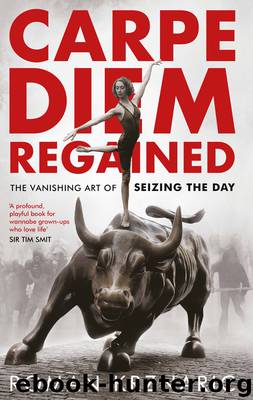Carpe Diem Regained by Roman Krznaric

Author:Roman Krznaric [Krznaric, Roman]
Language: eng
Format: epub
ISBN: 9781783523603
Publisher: Random House
Published: 2017-02-20T05:00:00+00:00
WHY BEING PRESENT IS NEVER ENOUGH
A curious feature of mindfulness techniques, whether of the new scientific or the older Buddhist variety, is that they set us a task – focusing on the present – that our brains are not well designed to perform. It’s no surprise that so many people get frustrated when they take up meditation, with their thoughts jumping about like crazy, worrying if they embarrassed themselves at work that day or wondering what to make the kids for dinner. That’s because thinking about the past and future is a natural trait of a healthy human mind: it’s essential for both our sense of identity and how we navigate the world. Just consider what it’s really like to live completely in the present – and I mean all of the time. If you find this scenario difficult to imagine, let me introduce you to Henry Gustav Molaison, one of the most studied individuals in the history of neuroscience research.
Henry, known in the scientific literature as ‘HM’, was born in Connecticut in 1926. In 1953, aged twenty-seven, he underwent an experimental form of lobotomy to relieve his debilitating epilepsy. But something went wrong. Although the frequency of Henry’s seizures went down, from that day until his death in 2008, he suffered from almost complete amnesia. Henry’s memory lasted around thirty seconds, and after that he forgot nearly everything. At the same time, his botched brain surgery deprived him of the ability to imagine future experiences – he couldn’t plan anything for the next day, month or year. This left Henry in a state of what neuroscientist Suzanne Corkin called ‘permanent present tense’, where he was ‘trapped in the here and now’.26 Corkin ran tests on Henry for forty-six years, but right to the end he still failed to recognise her whenever they met, even if she popped out of the lab for just ten minutes.
Could Henry function in day to day life? Only just. He could talk, read, do basic arithmetic and play bingo, but that was about it. When he went to a restaurant, he found it hard to order food as he had no idea what he liked. He couldn’t hold down a job because the moment he was taught to do something, he forgot it. He read and re-read the same magazines. He needed round-the-clock carers to remind him to wash himself and make sure he didn’t get lost walking in the local neighbourhood. He was pleasant and mild-mannered but he couldn’t make real friendships as he couldn’t recall anybody’s name or anything about them. He couldn’t remember his own age – and was often out by decades when he guessed. He had some memories of the time before his operation, but these were highly limited. ‘Being unable to establish new memories,’ said Corkin, ‘Henry could not construct an autobiography as his life unfolded’.27 Permanent immersion in the now left him with only the vaguest sense of personal identity, and unable to live independently.
We can read Henry’s story almost as an allegory about how much we need the past in our lives.
Download
This site does not store any files on its server. We only index and link to content provided by other sites. Please contact the content providers to delete copyright contents if any and email us, we'll remove relevant links or contents immediately.
| Anthropology | Archaeology |
| Philosophy | Politics & Government |
| Social Sciences | Sociology |
| Women's Studies |
The remains of the day by Kazuo Ishiguro(8961)
Tools of Titans by Timothy Ferriss(8357)
Giovanni's Room by James Baldwin(7313)
The Black Swan by Nassim Nicholas Taleb(7097)
Inner Engineering: A Yogi's Guide to Joy by Sadhguru(6780)
The Way of Zen by Alan W. Watts(6589)
Asking the Right Questions: A Guide to Critical Thinking by M. Neil Browne & Stuart M. Keeley(5749)
The Power of Now: A Guide to Spiritual Enlightenment by Eckhart Tolle(5740)
The Six Wives Of Henry VIII (WOMEN IN HISTORY) by Fraser Antonia(5493)
Astrophysics for People in a Hurry by Neil DeGrasse Tyson(5172)
Housekeeping by Marilynne Robinson(4432)
12 Rules for Life by Jordan B. Peterson(4298)
Double Down (Diary of a Wimpy Kid Book 11) by Jeff Kinney(4257)
The Ethical Slut by Janet W. Hardy(4235)
Skin in the Game by Nassim Nicholas Taleb(4231)
Ikigai by Héctor García & Francesc Miralles(4228)
The Art of Happiness by The Dalai Lama(4118)
Skin in the Game: Hidden Asymmetries in Daily Life by Nassim Nicholas Taleb(3985)
Walking by Henry David Thoreau(3948)
